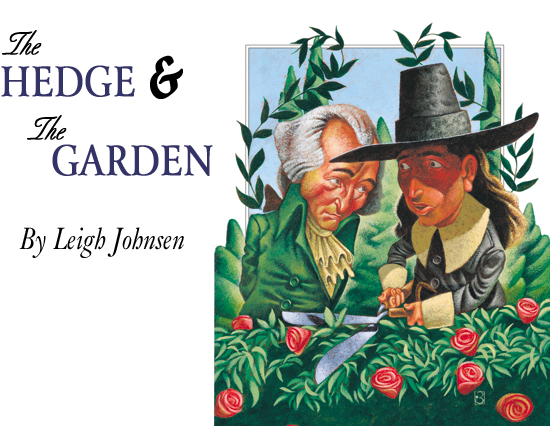The Hedge And The Garden
Leigh Johnsen May/June 2003
Illustrations by Ralph Butler

Today James Madison gets most of the credit for ratification of the First Amendment. His role was undoubtedly pivotal, but his involvement represents only part of the story. Thousands of others also worked for ratification, many of them members of the fastest-growing denomination in America during the late 1700s, the Baptists.
Descendants of sixteenth-century Europe's Anabaptists (literally "rebaptizers"), the Baptists of early Colonial America were often seen as dangerous radicals, particularly in New England and the South. Those who preached or practiced their religion in public often felt the lash of civil authorities through banishment and imprisonment. With other religious minorities, they were also taxed against their will to support state-sponsored religious establishments, which existed in most of the Thirteen Colonies.
Early America's Baptists had ample reason to appreciate freedom of conscience, or "soul liberty" in their own terminology, and they became champions of its cause. The most famous Colonial Baptist in the 1600s—though a Baptist for only part of his life—was Roger Williams. To ensure freedom of conscience, Williams established the colony of Rhode Island in 1636 with complete separation of church and state, a first for British North America. By the end of the seventeenth century, wording that echoed guarantees in Rhode Island's royal charter of 1663 had found its way into the charters of New Jersey and the Carolinas, and William Penn had started Pennsylvania under similar terms.
Williams' thinking rested on imagery and reasoning that resembled what later became Thomas Jefferson's famed "wall of separation" between church and state. In Williams' view, reality consisted of two basic spheres: the "garden" of Christ's church and the "wilderness" of the unregenerate world. To Williams, a "hedge" was needed to prevent civil authorities from encroaching on the sacred "garden" of Christ's church and violating consciences.
Baptist numbers and influence mushroomed during the era of the American Revolution thanks to a series of religious revivals that swept the Colonies starting in the 1740s. A new generation of leaders emerged, led by Isaac Backus of Massachusetts and Virginia's John Leland, who were eager to ensure freedom of conscience and rid the Colonies of legal arrangements that interfered with it. Baptists of the late 1700s waged an ongoing struggle with petitions, pamphlets, lawsuits, and civil disobedience, mainly in New England and the South, to bring an end to America's Colonial religious establishments.
The classic Baptist statement on these matters during the era of the American Revolution came from Backus, who built on Roger Williams' and previous Baptist thinking, and homed in on the Colonial religious establishments. Backus noted that Jesus never appealed to civil authorities for assistance. Instead, according to the New Testament Gospels, He rebuked His disciple Peter for using force, the basis of secular government, and in the end submitted to crucifixion without resistance. So different was His approach from that of secular governments, observed Backus, that Jesus described His "kingdom" as "not of this world."
Unlike Madison, who looked forward to a government purged of what he and many others of his time considered religious superstition, Baptists of Backus's generation welcomed the First Amendment from a Christian perspective, and their support was crucial for ratification. The First Amendment offered them hope for freedom in matters of conscience, especially freedom from forced participation in government-financed religion, which violated Scripture and divine example.
Americans today do well to remember their claim for freedom of conscience, which hearkens back in part to the experience of early America's Baptists. Those Baptists left to Americans of all religious persuasions a birthright that they neglect or misunderstand at their peril.

Leigh Johnsen is director of grants at Pacific Union College, Angwin, California. He holds a doctorate in early American history, with emphasis on the history of Christianity, and is editing the papers of Isaac Backus.